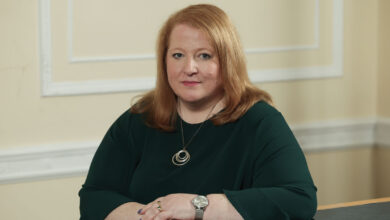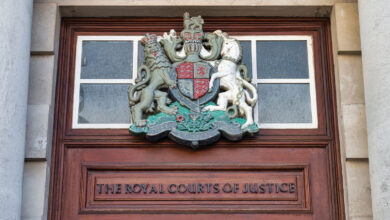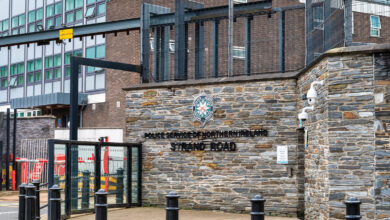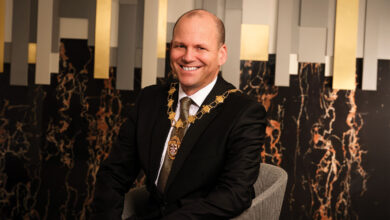Transformation and the PPS

Director of Public Prosecutions Stephen Herron talks to David Whelan about the impact of restructuring amidst decreasing budgets, public confidence, legacy and his desire to drive greater collaboration across the sector to improve outcomes.
Formed in 2005 to enshrine the separation of investigation and prosecution functions within the justice system, the Public Prosecution Service (PPS) has already undergone a series of transformative programmes as it seeks to balance demand against its budgetary capability as the principal prosecuting authority in Northern Ireland.
Originally rolled out as a regional service at various locations, the austerity agenda in and around 2014/2015 forced a rethink of spending by all government departments.
A key figure of the “comprehensive internal transformation” rolled out by the PPS as a result and recognised by the Department of Finance as an “exemplar” in transformational change to meet budgetary constraints, was then Senior Assistant Director Stephen Herron. Herron was appointed the Director of Public Prosecutions in January 2018 and recognises the significance of how the method by which they enacted efficiencies on enabling him to drive his current priorities.
The Director maintains that the restructuring, which saw a reduction of PPS presence in four regions reduced to two, including a 50 per cent reduction in office space, a 20 per cent reduction in staff numbers and revision of fees paid to external counsel, was a more responsible approach than what he describes as potential “salami cuts” to services each year.
Having qualified as a solicitor, Herron has over 18 years’ experience in the PPS, originally joining as a prosecutor in 2002 before climbing the various legal grades and working across most areas of the business.
Currently annual funding for the PPS sits below £35 million and it is estimated that efficiencies have saved some £7 million in annual operating costs. Herron believes that the necessity for change has been an important factor in the organisation’s ongoing drive for better outcomes but also recognises the challenges it brought.
“The challenge for us was to ensure that we weren’t taking a backward step and that in streamlining services we were still delivering for the public,” he explains.
“As a demand-led service, with little discretionary spend, it was crucial for us that we transformed in a way that was going to make our sustainable baseline something we could work with for future years.
“However, this left the organisation vulnerable to spikes and reliant upon in-year funding. Achieving a more sustainable baseline figure going forward is something we are going to be working with the Department of Finance and the Justice Minister on.”
Explaining the additional increased complexity in their work, Herron points out that while overall case numbers for the PPS have fallen, levels of cases classified in the serious categories have not. An example, he highlights, is that of sexual offences which have been increasing since 2012. As well as increasing case loads of serious crimes, work around such crimes has become more resource intensive including the likes of more digital material for review, increased victim and witness interaction and potential satellite litigation.
Herron says that it is tribute to PPS staff that public confidence levels and conviction rates have maintained at a high level despite considerable transformation and sustained work levels.
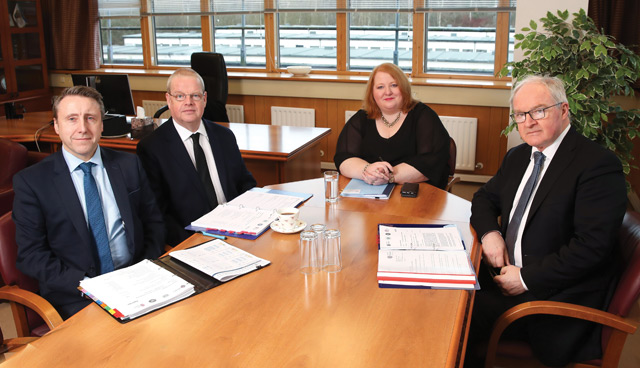
The oversight of the Criminal Justice Board is important in ensuring that stakeholders are working strategically and collaboratively to reduce the time taken to deal with criminal cases.
“Surveys have shown consistent levels of around two thirds of the population having confidence in the fairness, impartiality and independence of the service,” states the Director.
The PPS take an average of 50,000 prosecution decisions annually, around 70 per cent of which are decisions to prosecute or to proceed by diversion as an alternative to prosecution. The conviction rate in the Crown Court is around 85 per cent in the Crown Court and around 80 per cent in the Magistrates Court, figures which compare favourably with the rest of the UK and Ireland.
Herron believes that while the PPS has no targets for prosecution or conviction, the figures underline that the organisation is not risk adverse and “are generally finding the right balance in determining that there is a reasonable prospect of conviction in cases”.
Explaining what he outlines is a common misconception that a court ruling against conviction undermines the decision to prosecute by the PPS, Herron adds: “Our job is to make an assessment as to whether the available evidence is capable of supporting a prosecution, and if a case subsequently does not result in conviction that does not mean it was wrong to have the evidence tested in court.”
Change
Improved services listed by Herron as a result of change include the establishment of a Victim and Witness Care Unit in 2014, the creation of a Serious Crime Unit in 2016 and, more recently, the emergence of a Strategic Improvement Team last year, working more collegiately with other stakeholders in major areas of criminal justice improvement.
These changes form some of the basis of Herron’s priorities for the PPS as Director. Setting these out as ongoing pieces of work, Herron lists a desire to: tackle delay; improve victim experience; and maintain public confidence through open and transparent engagement.
The Director, a member of the Criminal Justice Board (CJB), recognises the ability for solutions to have positive impacts the range of priorities and all will require a collaborative approach across the sector.
Herron describes the ambition to improve the experience of victims and witnesses through the speeding up of cases from initial investigation through to court proceedings conclusion as his “single biggest priority” and recognises the reasons for delay in Northern Ireland as complex, primarily, because so many different agencies are involved, all with different functions and responsibilities.
He explains: “This is why the oversight of the Criminal Justice Board is important in ensuring that stakeholders are working strategically and collaboratively to reduce the time taken to deal with criminal cases. This requires a huge cultural shift from all parts of the system. We need to move to more proportionate case building focussed on reasonable lines of enquiry identified through prosecution engagement with police and defence representatives and supported by active case management from the judiciary.”
The return of the Executive and subsequently, a Justice Minister, has added fresh emphasis to the ambition to proceed with committal reform in Northern Ireland and eventually abolish the committal stage of court proceedings, a key element of reducing delay.
“The overall aim of the initiative is to speed up the conduct of cases, facilitate early and targeted case management and reduce demands on witnesses,” says Herron. “In short, there should be fewer, more effective court hearings,” he adds.
“However, delay will not be tackled solely through legislation. It will require a cultural shift through a change of process and practice.”
To some degree this cultural shift has already begun. In recognising that justice must compete with other budget priorities such as that of health and education, Herron sees the value in prioritising a programme of criminal justice transformation which focusses on cases involving the most vulnerable, where there is the greatest risks to society or where the impact of delay is recognised as particularly harmful.
However, he also recognises a greater role for the justice system as a whole to deal with low-level offending in a more proportionate way, freeing up resources. Of the 25,012 decisions issued by the PPS in Q1 and Q2 of 2019/20, 7,694 resulted in no prosecution and 1,802 were diversionary measures. With a growing awareness that prison is not suitable environment for many of the complex needs of those interacting with the justice system, Herron outlines a desire to see further progress on ongoing work in areas such as problem-solving justice, focussed on tackling the root causes of offending and providing better outcomes.
“I would like to see a more innovative approach taken to criminal justice transformation so that lower level offending is dealt with in a more proportionate way, allowing for available resources to be targeted towards speeding up and improving services for those serious cases which most concern the public and cause harm to society,” Herron states.
If we don’t do the SHA we are going to continue with the current disjointed system which I think is letting everyone down.
Returning to his priorities, Herron says that a key element of improving outcomes for victims and witnesses is a more open and transparent process. The PPS has for many years been engaged in improving the understanding of the prosecutor’s role and better communicating with victims its decision making. Herron says that the organisation works closely with victim representative groups to ensure they are meeting victim needs and points to the example of the move to embed Victim Support NI staff into their two victim and witness care units (VWCU).
“We also recently established a stakeholder engagement forum to ensure our current policies and service delivery plans are victim-focussed and meet the needs of a wide and diverse range of users,” he adds.
The Director says that he also recognises the importance of external visibility as part of their accountability framework. Basic but fundamental changes have included a redesign of their website and active social media accounts with improved content and greater accessibility. The PPS have also moved to improve relationships with the media, organising media briefings in cases of considerable public interest, which Herron believes has helped improve the balance and accuracy of reporting.
Legacy
An area where this has been particularly relevant is that of legacy, an area defined by Herron as one that could have “a major impact reputationally” on a criminal justice system that is struggling to deliver without a bespoke process for dealing with the past. Describing the current mechanisms as dealing with legacy as “ineffective” and “dysfunctional”, Herron highlights that the PPS is not funded for legacy work and points to the burden of caseloads and satellite litigation on criminal justice organisations while also recognising the huge emotional cost to families of victims.
The Director has welcomed the commitment under New Decade, New Approach to give effect to the Stormont House Agreement (SHA) within 100 days but believes that achieving this will be difficult giving the conflicting views in Northern Ireland and at Westminster about dealing with the past.
Failure to legislate for SHA would see legacy cases continue to come to the PPS, which would be competing with modern day work without additional resources.
“If we don’t do the SHA we are going to continue with the current disjointed system which I think is letting everyone down,” says Herron. “However, I think it is going to be a difficult issue to deal with politically and my concern is that in the time needed to get a consensus, victims are being let down. It’s coming at a huge emotional cost to those victims but it’s also coming at a huge cost to the organisations involved. I would advocate the need to take a victim centred approach to the issue, ensuring sensitivity to all those who have been impacted by the Troubles.”
Concluding, Herron stresses that the priorities of the PPS and improvements to the justice system will take time to deliver, however, he hopes the PPS can play a major role in driving significant progress in the remaining two year mandate of the Executive and on into the next mandate.

